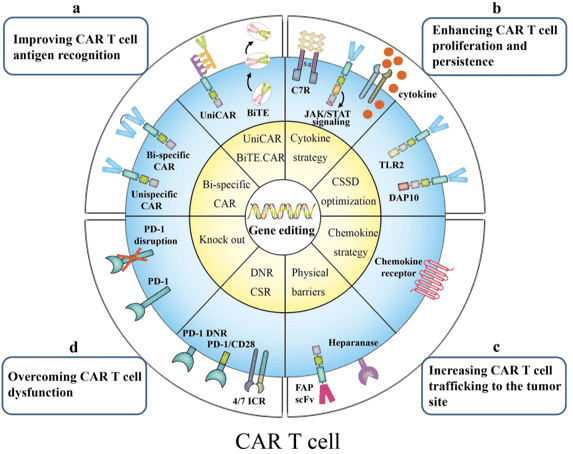All products and services are For Research Use Only and CANNOT be used in the treatment or diagnosis of disease.
Immunotherapy has become the backbone of cancer treatment. Among them, chimeric antigen receptor (CAR) T cells have achieved great success in the treatment of hematological malignancies. However, CAR T treatment for solid tumors is less effective. Antigen targeting, CAR T cell infiltration, proliferation, and persistence are the main obstacles preventing CAR T treatment from spreading to solid tumors. To overcome these obstacles, the next generation of CAR T cells will need more effective anti-tumor properties, which can be achieved through gene-editing technology.
At Creative Biolabs, we always keep pace with the most cutting-edge progress and master innovative strategies to enhance CAR T cell function by improving target recognition, persistence, transportation, and overcoming inhibitory TME. Empowered by the advanced Smart™ CAR development platform, Creative Biolabs is capable of providing a variety of next-generation CAR vector products, such as synnotch CAR, universal CAR, overexpression CAR and switch CAR, etc. These next-generation CAR structures can improve antigen recognition capabilities and reduce immune escape.
By optimizing costimulatory signals and overexpressing cytokines, the proliferation and persistence of CAR T cells can be enhanced. CAR T cells equipped with chemokines or chemokine receptors help overcome their poor ability to home to the tumor site. Strategies such as eliminating immune checkpoint molecules and incorporating dominant negative receptors and chimeric switch receptors may contribute to the depletion or reversal of negative T cell regulatory factors in TME. Moreover, it has been proposed that to overcome the low and variable expression of tumor-specific antigens, multiple antigens could be targeted simultaneously using dual CAR-T cells that express two CARs on their surface, or use more novel CAR designs, such as tandem CAR-T cells, combined CAR or synNotch receptors.
In summary, the current new strategies for enhancing CAR T cell function and improving the therapeutic response to solid tumors mainly include: targeting multiple antigens, overexpressing cytokine or chemokine receptors, enhancing costimulatory signals, and eliminating negative T cells regulators. These next-generation CAR T cells have shown promise in preclinical models, and they have broad prospects in the treatment of solid tumors.
 Fig.1 Strategies for modification of genes in next-generation CAR T cells.1
Fig.1 Strategies for modification of genes in next-generation CAR T cells.1
Creative Biolabs provides multiple novel non-regular CARs, including but not limited to:
Please browse the target below to find the right product for you.
We have developed a proprietary online system for customizing CAR and CAR cell products, which offers full options to meet all unique needs, including but not limited to conventional or unconventional. CAR constructs, as well as a variety of vectors and cells. The customization process can be completed with just a few simple clicks, please feel free to try it out.
Reference
 NEWSLETTER
NEWSLETTER
The latest newsletter to introduce the latest breaking information, our site updates, field and other scientific news, important events, and insights from industry leaders
LEARN MORE NEWSLETTER NEW SOLUTION
NEW SOLUTION
CellRapeutics™ In Vivo Cell Engineering: One-stop in vivo T/B/NK cell and macrophage engineering services covering vectors construction to function verification.
LEARN MORE SOLUTION NOVEL TECHNOLOGY
NOVEL TECHNOLOGY
Silence™ CAR-T Cell: A novel platform to enhance CAR-T cell immunotherapy by combining RNAi technology to suppress genes that may impede CAR functionality.
LEARN MORE NOVEL TECHNOLOGY NEW SOLUTION
NEW SOLUTION
Canine CAR-T Therapy Development: From early target discovery, CAR design and construction, cell culture, and transfection, to in vitro and in vivo function validation.
LEARN MORE SOLUTION

